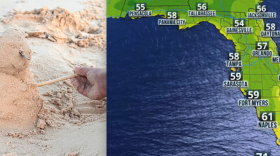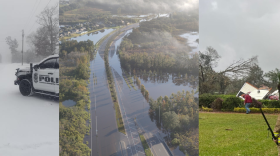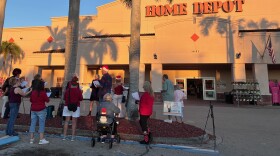The StoryCorps Mobile Tour returned to Fort Myers in February and March 2024 to record meaningful conversations with people right here in Southwest Florida about their lives.
Each Monday, we’re highlighting some of the compelling stories from our fellow Southwest Florida residents.
In this installment, we hear Sunny Lubner interview her very good friend Ella Nayor about her career in journalism, her life-long interest in Holocaust studies and her passion for anti-hate work.
Transcript:
SUNNY LUBNER: Ella, what did you want to be when you grew up?
ELLA NAYOR: I always wanted to be a journalist because I dreamed I'd have my own paper. Years later, I would marry my husband, who would own a paper, Florida Weekly, but I always wanted to be a journalist throughout my entire life, and I did wind up becoming a journalist.
LUBNER: Yes, you certainly did. When did you start writing?
NAYOR: Since I was a child I used to always write poems and I'd write stories. I remember documenting. I was always a documenter. I remember, we were in a car accident. I was like, seven years old, and I still somewhere in my parents house, have this little diary I kept. I wrote all about the car accident and what happened and all the little details, because, you know, I was a journalist even then. I would always walk around the house interviewing my parents, interviewing everybody. So, yeah, it started pretty young. In one of the papers, actually, I actually had to be everything, like, in a lot of small papers. I did the advertising and I did the writing, but I always got to break the stories that mattered to people. Like, since I graduated in ‘93 I was, you know, a product of that age group. Homophobia was a big issue. Then, back then, it was still a little where people had to be in the closet and under the radar. And I remember writing this story where I met in the basement of an Episcopal Church where the LGBT group at the time would go and meet and have their meetings and try to have some camaraderie and understanding that they let me come in and interview them. And I wrote this whole story to try to, even back then, to try to help people understand that it's okay to be whoever you are. And I remember interviewing one of the people, I asked him, “Is there anything you want, like, general community know?” Like, “We just want the straight people know we're not after them. We're not trying to pick them up. We're just trying to be regular human beings.” And it always stood with me, and I still have that quote, and I still have the newspaper, but it comes back to humanity we're living now. And then I just wound up working for newspapers throughout my life.
LUBNER: And you were an editor?
NAYOR: Yes. I was an editor then, and then I was an editor for an army newspaper. My ex husband was military, and so I got to write military stories. And I got to do one of my first Holocaust pieces, and that was really met with somebody who was a survivor and wanted to thank the American GIs. He brought tears to the entire room of these tough, burly guys. And they all got choked up when he thanked him, told them how much it meant to him and his family that they liberated them. He was this tough little man named Henry Greenbaum, and I remember afterwards I went to talk to him, to get a few quotes, and he looks at me, and nobody was around anymore, and he goes, “Are you Jewish?” And at that point, I used to stay in the closet about my Jewishness because of my dad. He wanted to keep us safe, so I wasn't really allowed to ever tell anybody. So, I spent most of my young adult life kind of being in a closet, going to Catholic mass. My friends, you know, trying to fit in wherever I could. But for some reason I told him, I said, “I am.” He broke down into tears, and then his accent came back, and he started talking with a strong German Yiddish accent to me and telling me what they really did. What he did, told the military was he thanked them, and I'm fine. I'm strong, but he's like, “You should have seen what they did to us,” you know, the abuse and everything, and I'll never forget him. He broke down and told me that, and I was like, “I'm gonna have to continue to document this” and, you know, so, that was one story that sticks out.
LUBNER: That's an extraordinarily moving story. When did your interest in the Holocaust first begin? Do you remember?
NAYOR: Since I was a child. I would, I was always interested, like, I would buy I had, like, when kids had books about, like, makeup and stuff, I would be, like, buying Holocaust books. I mean, not that I didn't have the makeup and, you know, girly stuff too, but just to say, you know, but I, but I had all these books, and I just knew I had to have them, and I had to read about everything. But, um, when it really came back full force was when I was 29 years old, and I got a job working for the News-Press. I just moved down here.
LUBNER: And so you're furthering your studies. Talk about that.
NAYOR: I just graduated with my Holocaust and Genocide Studies graduate degree at Gratz college, one of the oldest Jewish colleges in the country, in Philadelphia. And what's good about that is that people that are Jewish, Christian and Muslim, actually participate in this program because they want to learn, which really humbled and awed me when I would see people that are not Jewish wanting to learn and understand because that's a lot of bravery. And that's it's pretty amazing to really go out of your comfort zone. We learned so much, and that was part of the degree was not just learning straight the nuts and bolts of the Holocaust, but learning about other genocides. We learned about so many different parts of the world, and just how we keep perpetuating all kinds of things that we do to each other as human beings, dehumanization and oppression and all the horrors that we do that I felt it's important that now I can go out there and be teaching it, whether it's in community programs or anything, that get the word out there that we can be better. And my next goal is, actually, I'm applying for the Ph.D. program to go and continue the work with it, and to be able to go and meet with people of all different faith traditions and show us how we're all tied together.
LUBNER:If the meaning of life is to find one's purpose, have you found yours?
NAYOR: Yes. I'm very thankful and blessed to say that I'm not one that has to feel like I'm searching for who I am and what I am. You know, I will be for the rest of my life, doing Holocaust and anti-hate work and that takes in everybody. I always tell everybody, the Holocaust is my platform, but it is for everybody, because if you're truly to honor the Holocaust, you have to honor everybody that is being oppressed and suffering. That is the only way we will truly honor what happened in the Holocaust, is to honor everyone now that is experiencing horrors and genocide.
JOHN DAVIS, HOST: That was Sunny Luber interviewing her good friend Ella Nayer. The conversation was recorded in Fort Myers through the StoryCorps Mobile Tour. This is WGCU News.
WGCU is your trusted source for news and information in Southwest Florida. We are a nonprofit public service, and your support is more critical than ever. Keep public media strong and donate now. Thank you.








